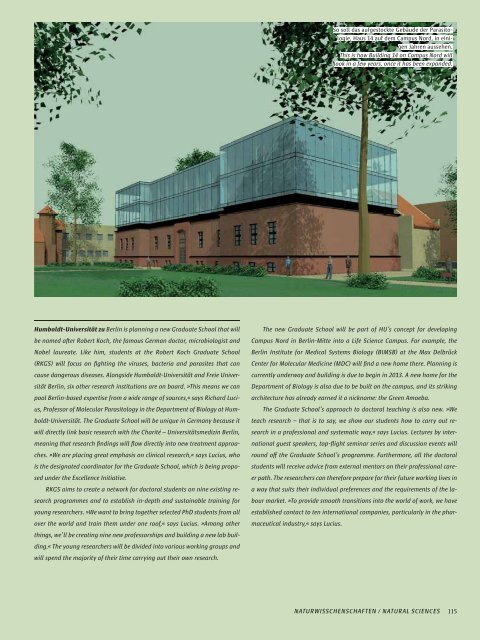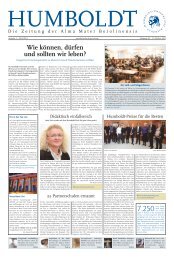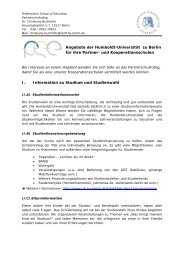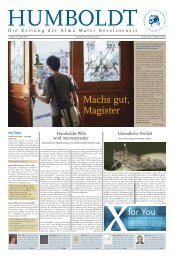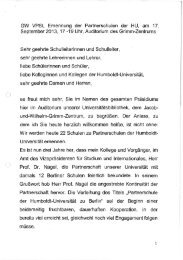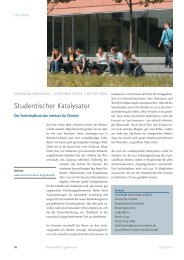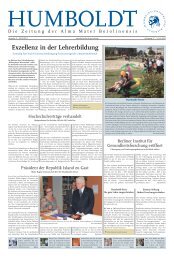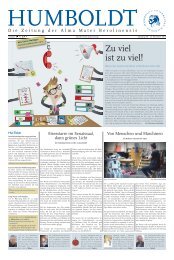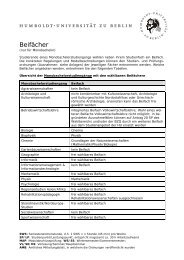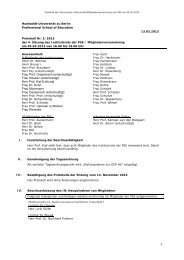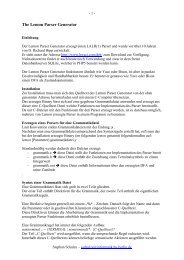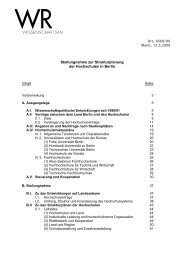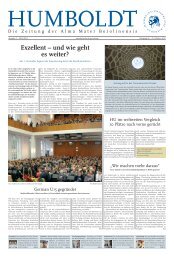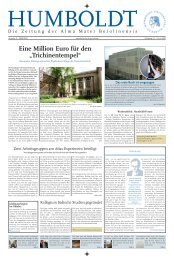hu wissen 3 (pdf) - Humboldt-Universität zu Berlin
hu wissen 3 (pdf) - Humboldt-Universität zu Berlin
hu wissen 3 (pdf) - Humboldt-Universität zu Berlin
Sie wollen auch ein ePaper? Erhöhen Sie die Reichweite Ihrer Titel.
YUMPU macht aus Druck-PDFs automatisch weboptimierte ePaper, die Google liebt.
So soll das aufgestockte Gebäude der Parasitologie,<br />
Haus 14 auf dem Campus Nord, in einigen<br />
Jahren aussehen.<br />
This is how Building 14 on Campus Nord will<br />
look in a few years, once it has been expanded.<br />
<strong>Humboldt</strong>-Universität <strong>zu</strong> <strong>Berlin</strong> is planning a new Graduate School that will<br />
be named aer Robert Koch, the famous German doctor, microbiologist and<br />
Nobel laureate. Like him, students at the Robert Koch Graduate School<br />
(RKGS) will focus on fighting the viruses, bacteria and parasites that can<br />
cause dangerous diseases. Alongside <strong>Humboldt</strong>-Universität and Freie Universität<br />
<strong>Berlin</strong>, six other research institutions are on board. »This means we can<br />
pool <strong>Berlin</strong>-based expertise from a wide range of sources,« says Richard Lucius,<br />
Professor of Molecular Parasitology in the Department of Biology at <strong>Humboldt</strong>-Universität.<br />
The Graduate School will be unique in Germany because it<br />
will directly link basic research with the Charité – Universitätsmedizin <strong>Berlin</strong>,<br />
meaning that research findings will flow directly into new treatment approaches.<br />
»We are placing great emphasis on clinical research,« says Lucius, who<br />
is the designated coordinator for the Graduate School, which is being proposed<br />
under the Excellence Initiative.<br />
RKGS aims to create a network for doctoral students on nine existing research<br />
programmes and to establish in-depth and sustainable training for<br />
young researchers. »We want to bring together selected PhD students from all<br />
over the world and train them under one roof,« says Lucius. »Among other<br />
things, we’ll be creating nine new professorships and building a new lab building.«<br />
The young researchers will be divided into various working groups and<br />
will spend the majority of their time carrying out their own research.<br />
The new Graduate School will be part of HU’s concept for developing<br />
Campus Nord in <strong>Berlin</strong>-Mitte into a Life Science Campus. For example, the<br />
<strong>Berlin</strong> Institute for Medical Systems Biology (BIMSB) at the Max Delbrück<br />
Center for Molecular Medicine (MDC) will find a new home there. Planning is<br />
currently underway and building is due to begin in 2013. A new home for the<br />
Department of Biology is also due to be built on the campus, and its striking<br />
architecture has already earned it a nickname: the Green Amoeba.<br />
The Graduate School’s approach to doctoral teaching is also new. »We<br />
teach research – that is to say, we show our students how to carry out research<br />
in a professional and systematic way,« says Lucius. Lectures by international<br />
guest speakers, top-flight seminar series and discussion events will<br />
round off the Graduate School’s programme. Furthermore, all the doctoral<br />
students will receive advice from external mentors on their professional career<br />
path. The researchers can therefore prepare for their future working lives in<br />
a way that suits their individual preferences and the requirements of the labour<br />
market. »To provide smooth transitions into the world of work, we have<br />
established contact to ten international companies, particularly in the pharmaceutical<br />
industry,« says Lucius.<br />
NATURWISSCHENSCHAFTEN / NATURAL SCIENCES<br />
115


